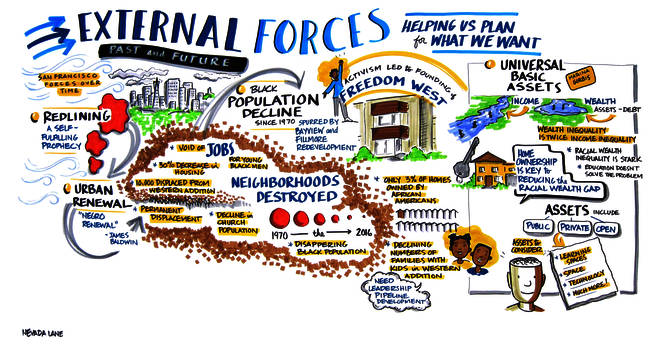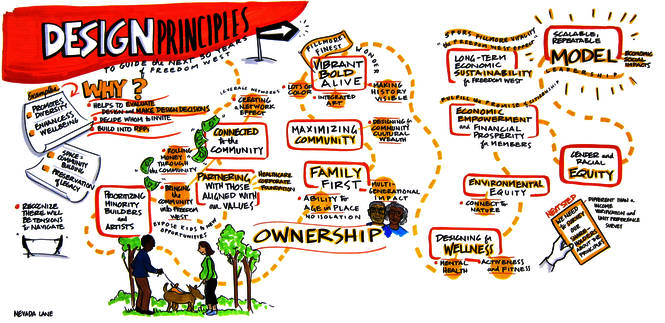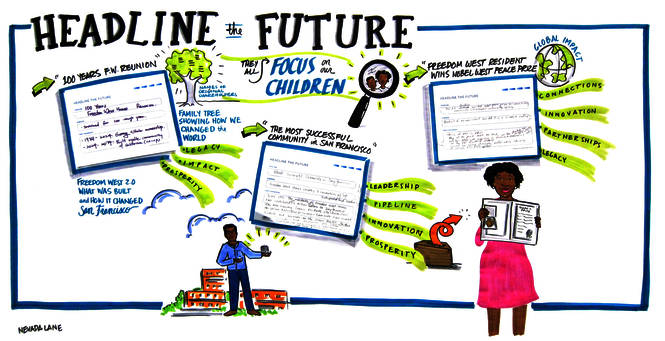Freedom West Homes, a 48-year old co-operative in San Francisco’s Fillmore District, approached Institute for the Future about working with them to help craft a vision for their future. Once a part of the vibrant “Harlem of the West,” Freedom West saw its neighborhood and Black culture around it destroyed by the city’s urban renewal program. They are planning an extensive redevelopment and expansion, and have engaged IFTF to help create design principles to inform what their future will look like. In a city that has been rapidly changing and gentrifying, Freedom West has allowed its members to stay in their homes; but they want to do more than that—they want to become a city within the city, and provide a haven for members of the Black community who have been forced out over the last few decades.
Home ownership is a key driver in securing a more equitable future. According to a new report from inequality.org at the Institute for Policy Studies, “the effects of the racial wealth divide are particularly pernicious in home ownership, one of the driving forces of wealth accumulation in the United States. The combined $921 billion in wealth of the top 12 U.S. billionaires is the equivalent to the home equity wealth of the entire Black population of 17 million households.” Through the vision of Bethel AME Church pastor Rev. J. Austell Hall, Freedom West’s co-op home ownership structure, along with support from members of the Black Church, allowed it to survive in place through waves of development and gentrification.
IFTF and Freedom West will be working together over the next year to bring a futures thinking lens to this real estate development and creation of an ecosystem of services, support, and stakeholders. IFTF is working with Freedom West on their plans for Freedom West 2.0: an expansion of affordable residential units, preservation of opportunities for home ownership, on-site services, programs for youth and seniors, and an innovation center. Earlier this year, we met with the co-op board members for a day-long workshop during which they shared the origins and philosophy of Freedom West, their personal histories, and what Freedom West has meant to them and the larger community over the years.
Through this storytelling, we collectively identified key values that Freedom West has come to embody, and then worked to translate those values into design principles, the criteria which the Board will use to evaluate a series of decisions regarding Freedom West 2.0, future onsite programming, community-related amenities, and potential long-term partners.
In this moment as the country is reckoning with its past, where underlying structures and policy decisions made decades ago continue to drive inequality, one way to create a more inclusive narrative of the future is to uplift voices from communities who have been excluded from the past. In that spirit, we are featuring the story of Freedom West as told by its President, Mattie Scott.
Mattie’s family moved to San Francisco from New Orleans to escape Jim Crow. They first lived in the Mission District before moving into Freedom West. Mattie is an advocate for ending gun violence, and is the Founder and Executive Director of Healing 4 Our Families & Our Nation, is the chapter leader for SF Mothers In Charge, and the Brady United San Francisco Chapter.
Freedom West President Mattie Scott writes:
“I’ve watched this neighborhood and community change. When I came here, this community was predominantly African American, we had our own restaurants and shops and it was thriving. You didn't have to go outside your community for anything. People could always come and live in our neighborhood, but we could not always go in other neighborhoods."

Image by Nevada Lane
In the workshop, Freedom West board members shared their personal histories, and we discussed the historical forces - such as redlining and urban renewal - that created the conditions for their experiences. They said that seeing the historical data gave them a sense of validation and even more drive in their determination to maintain what Freedom West has been for them.
"[Former San Francisco Mayor] Willie Brown came to Freedom West’s 25th anniversary, he was so ecstatic about this place. All the housing developments around us were being torn down, but we were still there. The African American community has been erased from San Francisco. It feels like we got left behind. I look out my window and see high rises all around me, with exercise rooms, daycare, etc. and we're just sitting on this dilapidated property.
I see Freedom West as the vehicle to bring back families, particularly African American families who were forced out of the city because of redevelopment, and who continue to be gentrified out. Freedom West 2.0 will help build equity, it will help maintain our ability to not ever have to lose land again. It will hold us for the next 50 years.
In the south, because of Jim Crow, if you didn’t own your own property, people would make you work for free, or worse. Landlords would take advantage of women who didn’t have the rent. Homeownership is vital to maintaining family, environment, and cultural richness. But in order to achieve homeownership, you have to have good credit, stable resources. If we didn’t have Black churches and pastors, Freedom West wouldn't be here. We were denied loans to fix up properties, the church sponsored the project. So the co-op model and home ownership has been very important for African American community.
It’s difficult for us to think about the future because of current political structures, police brutality across the country. Practicing foresight techniques helped us see how things could look for us, to envision children and families thriving here again. It helped us look strategically at areas we hadn’t examined: looking at the past, present, and future external forces, talking about governance. We went deep into what we were feeling from our cultural experiences [to create design principles]. The [IFTF] design principles workshop helped us see the pride we have and helped us realize that home for us is a rich legacy that can’t dismantle it."

Image by Nevada Lane
We discussed the values and social principles that have made the Freedom West community what it is - and how to translate those values into design principles for its development going forward.
"For example, one of the design principles we came up with is “Opportunity.” We want to create an innovation center. I will be able to go to the center in my own home. My grandchild won't have to go anywhere - it will be all right here. Exercise, health, a multitude of things will be here.
My past experience gives me hope for the future. I look back on what we’ve accomplished in a dilapidated Fillmore community when they were tearing down everything and everything looked so bleak. No one wanted to do anything in this community at this time. There was racial injustice, police brutality back then. We made it through Jim Crow, through drug wars, through redevelopment. Have things gotten better? Yes they have. Forty years ago I couldn't say the majority of my people are college graduates, that the majority of them own their own homes. Today I can say that. It gives me hope - looking back at the pain, hurt, suffering, racism, bias, we pulled through. I went through not being able to sit at a lunch counter to being able to go into any restaurant and eat. I couldn't go to a white school.
From where I came from to where I am now gives me a lot of hope for the future. There are people of every color where I live. When I see the protestors I see hope, justice, I see my community. Everyone is angry now. It’s not just me. Everyone is screaming justice, equity, fair housing, affordable housing to pull down racism. Everyone is out there now. That gives me hope. Gives me hope for Freedom West. I have hope that everyone will want to live here. We have to keep hope alive and be dreamers. Freedom West was born from true faith in God and a vision. Without Vision, the people perish. Faith without works is dead and we will remain faithful in God like Rev. J. Austell Hall.”

Graphic Recording by Nevada Lane
We ended the workshop with a foresight practice called "Headline the Future" where board members created stories from the future that reflected the impact they want Freedom West to have.